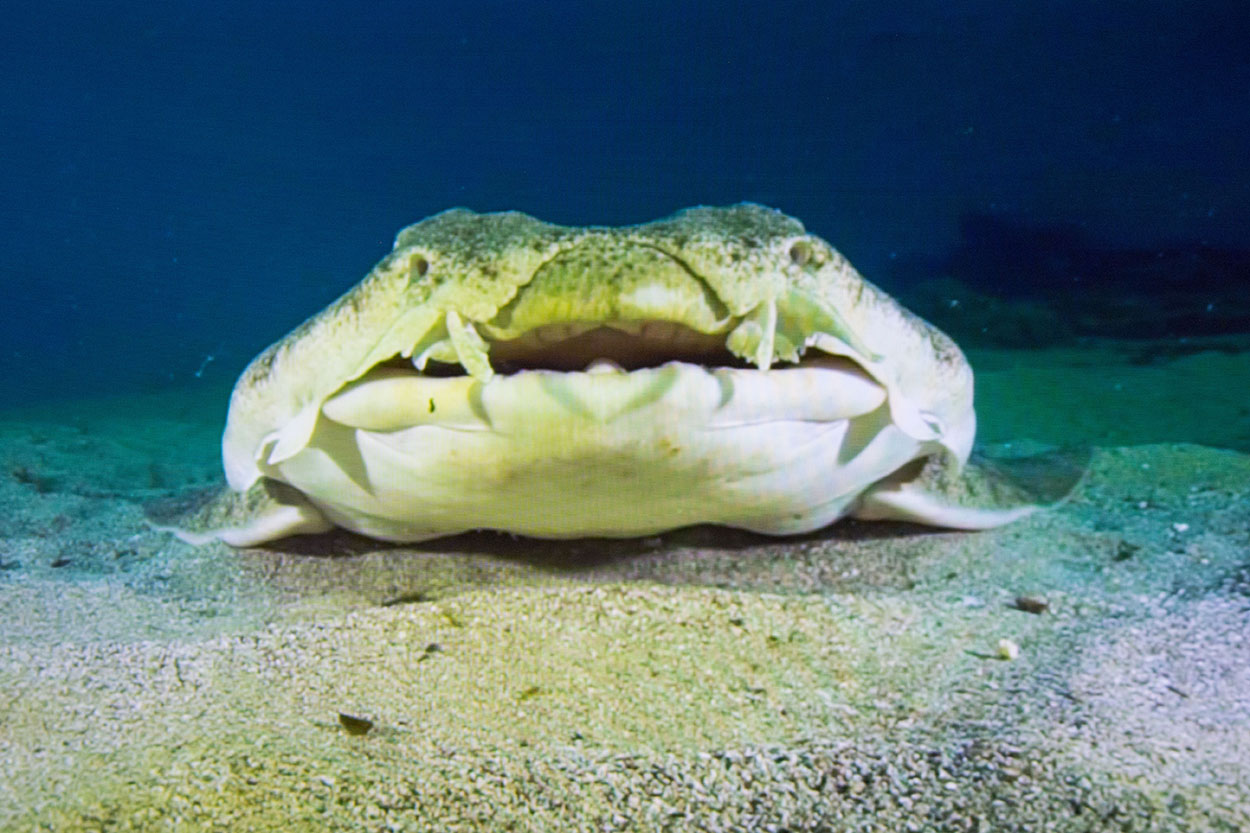This 18-month project, led by the ECOAQUA University Institute, is the second phase of a line of research into the circadian and seasonal rhythms of angelsharks and their movements. The aim is to expand the horizons of knowledge on the ecology of this species and to establish guidelines that will help to make its recovery compatible with the tourist use of the waters.
The study, which started in December 2020, contributes to the implementation of new research methods such as acoustic tagging and remote tracking with autonomous surface vehicles for the monitoring of different marine species. An innovation with international impact, as the Canary Islands are considered to be one of the main bastions for the survival of this species around the world.
Acusquat II, a project led by the University Institute for Research in Sustainable Aquaculture and Marine Ecosystems (ECOAQUA) of the University of Las Palmas de Gran Canaria (ULPGC), continues the work started in Acusquat, and also has the participation of other university institutions such as the University Institute of Intelligent Systems and Numerical Applications in Engineering (SIANI), the ULPGC Marine Science and Technology Park Foundation, the ULPGC Mathematics Department, as well as researchers associated with the 'Angel Shark' project.
It is titled "Acoustic monitoring of the behaviour of the Angelshark in critical conservation areas" and over the course of 18 months it will also enable the planning and management of the Red Natura 2000 areas to be adapted in order to promote the preservation of this species in deeper areas far from the coast of the Canary Islands archipelago.
The Angelshark, whose scientific name is Squatina squatina, is a species that is currently critically endangered worldwide and has recently been included in the Spanish Catalogue of Threatened Species. Stable populations of this fish have reduced exponentially in their geographic distribution around the globe, mainly due to overfishing.The waters of the Canary Islands are considered one of the last bastions on the planet for their survival, as this marine species uses the sheltered bays of the islands as critical breeding and nursery grounds. In this sense, inappropriate tourism development in the Canary Islands poses a serious risk to its survival.
The Acusquat II project is supported by the Biodiversity Foundation of the Ministry for Ecological Transition and the Demographic Challenge, with a budget of almost 87,000 euros, of which 64%, 55,641.12 euros, is provided by the Foundation itself and the rest by the ULPGC. Its principal objective is the development of new methodologies for the monitoring of different marine species that, for reasons similar to those of the Angelshark or for other causes, are susceptible to study. In this case, it would be the first experience of tracking angel sharks with autonomous surface vehicles during the phase when displacements of individuals from shallow waters to deeper areas occurs.
Thanks to acoustic tagging, as well as remote monitoring by autonomous surface vehicles, there are high expectations for new knowledge in the field, as, for example, acoustic tagging of sharks is still in the development phase. The achievement of these novel results together with the use of these methods are innovations that have international impact, as the Canary waters are home to the principal refuge for the angelshark in the world.
The territorial scope of this project is considered an absolute priority for the Marine Strategy in the Canary Islands Demarcation, involving areas included in the Red Natura 2000, whose management strategies could be updated with the new data and information generated by the study. Furthermore, the results obtained will be easily replicable in other areas of the Canary Islands where there are also high concentrations of this marine species at serious risk of extinction.
The Acusquat II team is formed by Dr José Juan Castro Hernández, from the Biodiversity and Conservation group (BIOCON) of the University Institute ECOAQUA, as principal investigator; and he is accompanied by Airam Guerra, from the same university institute; Dr Jorge Cabrera Gámez, Dr Antonio Carlos Domínguez Brito and Dr José Daniel Hernández Sosa, from the SIANI Institute; Dr Ángelo Santana del Pino, from the Mathematics Department of the ULPGC; as well as Diego Gamo Campos. As part of the 'Angel Shark Project', a project funded by the Zoological Society of London (ZSL) and in which the ULPGC collaborates, Dr. David Jiménez Alvarado, also associated with the University Institute ECOAQUA, and researchers Belén Caro Torti, Michael Sealey and Hector Toledo Padilla are participating.
In Acusquat I, a total of 15 individuals were acoustically tagged, while in the course of Acusquat II it is expected that up to 26 individuals will be tagged, surpassing the 40 marks, which means a significant increase in the number of angelsharks monitored using this methodology. In the first phase of the project, the research area encompassed up to five different beaches, four of them subject to the pressure of high intensity tourist use, circumstances that allowed the automated monitoring of some 385 hectares of marine Red Natura 2000.
The Acusquat II project therefore represents a step forward in the context of the series of actions that have been developed by the ULPGC in recent years on the study of Angelshark conservation. The 'Angel Shark Project' (ULPGC, Zoological Society of London and Alexander Koenig Museum), the Action Plan for the Angelshark in the Canary Islands or the IUCN Shark Conservation Programme (IUCN SSG - Shark Specialist Group) are other actions integrated in this line of research of the ULPGC.


